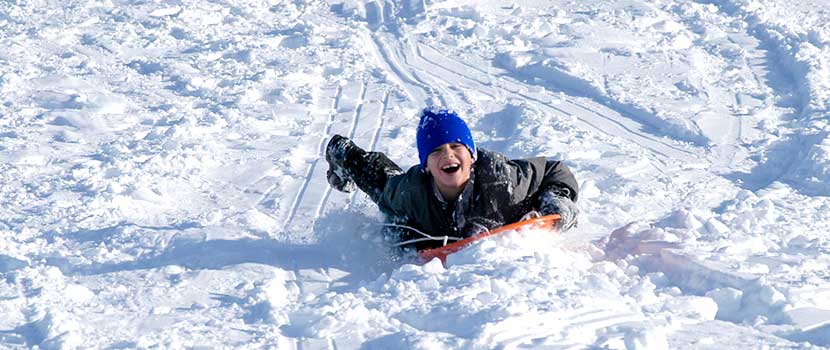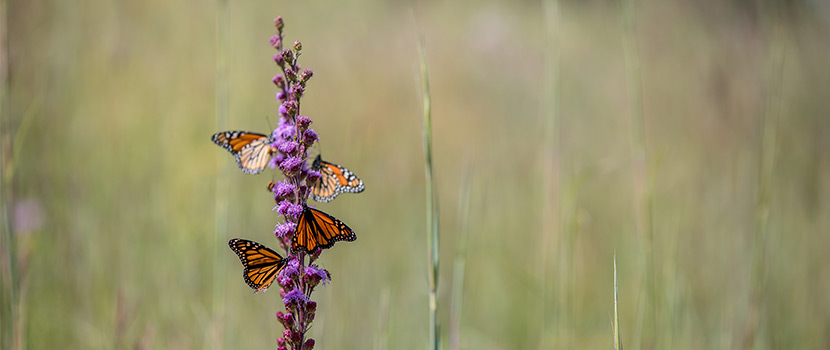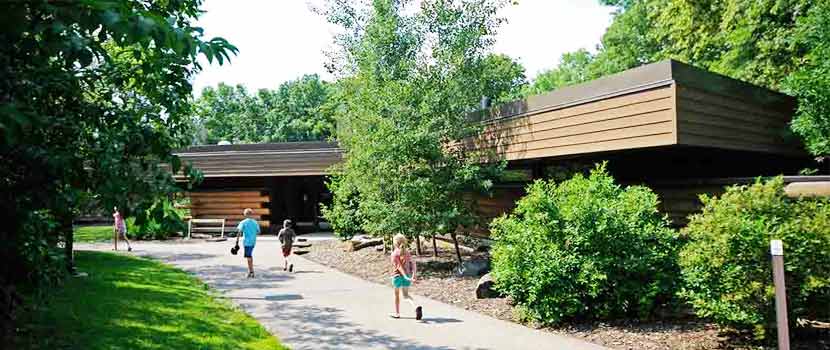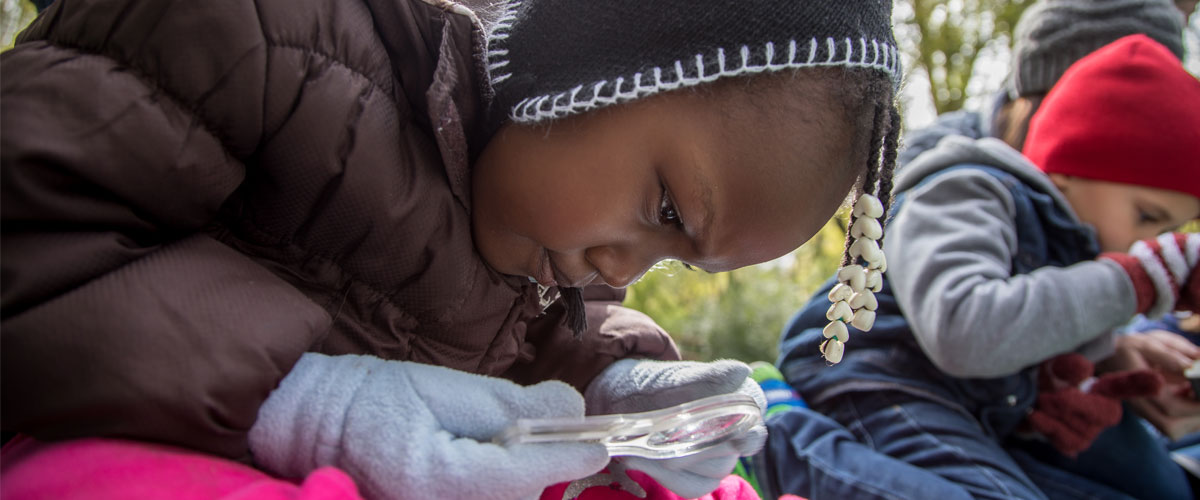
Nature School: Taking Preschool to The Great Outdoors
By: Megan Kelzenberg
January 22, 2020
Category: Nature Notes
Imagine a preschool with no walls; a place where children are encouraged to follow their interests. Where math and measurement are practiced in a mud kitchen, and scientific thinking happens naturally while rolling over a log to find insects. A place where the teachers are kind, fun, creative and highly-trained in both early childhood education and environmental education.
No imagination is needed — we have this preschool program right here at Three Rivers!
At Nature School, based out of Mississippi Gateway Regional Park, the outdoors is not just for recess; it is the primary classroom.
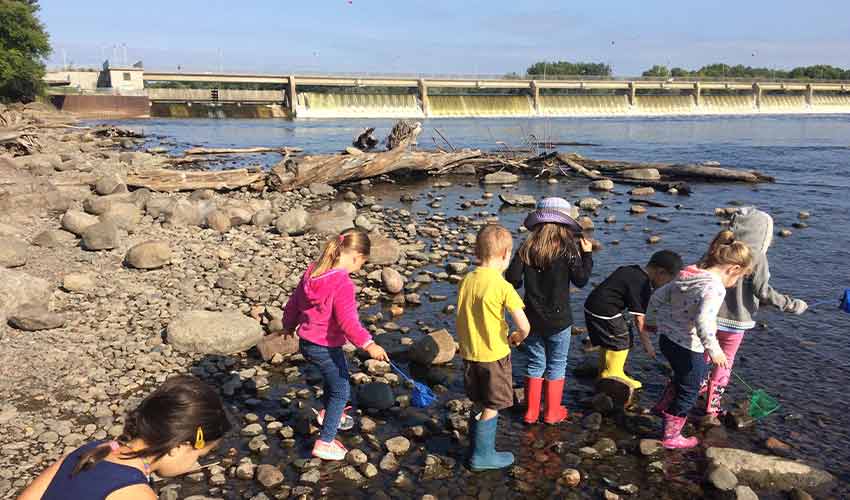
And reversely, students occasionally experience a short “ indoor recess” by heading inside the Visitor Center to meet a live animal or make an entry in their nature journals.
Why the flip-flop on such a well-established model?
The growing list of researched benefits from learning in outdoor environments suggests a need for looking at early childhood education through a new lens, to ensure our happy children grow into happy teens and adults.
Joyfully Engaged Learning
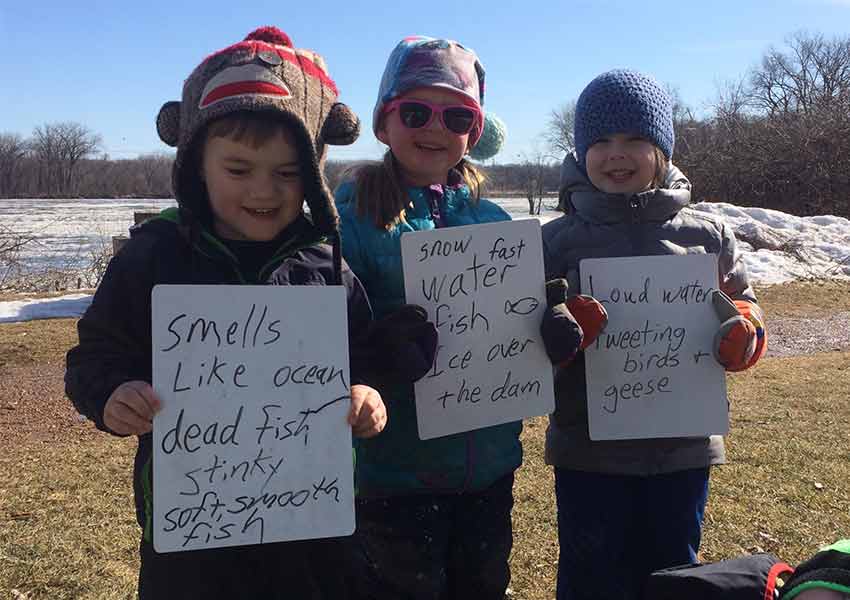
Minnesota’s Early Learning Standards state that for preschoolers, play and exploration are the most meaningful ways for children to acquire skills and knowledge as well as to practice skills and refine understanding of new concepts.
It is easy to see how the great outdoors naturally brings out a child’s desire to play and explore, thus encouraging them to learn alongside their discoveries. It may also be easy to imagine how fine and large motor skills will be well-toned due to learning in the outdoors.
What is perhaps harder to envision, is how more cognitive academic concepts like math and literacy can thrive without the use of an indoor classroom or desk.
With a little creative thinking, Nature School teachers shed new light on a few of the more traditionally indoor academic domains:
Math
- Counting and exploring quantity while following a recipe in the mud kitchen or creating your own recipe (Bonus points for sensory development if you become mud-covered in the process!)
- Measuring the length of icicles or earthworms, then placing them in order from smallest to largest
- Matching shapes and recognizing movement patterns while following animal tracks
Literacy
- Using a combination of drawing, dictating, and writing to narrate the day’s adventures within their personal nature journals
- Exploring letter sounds and rhyming words to match a plant or animal of interest
- Relating objects in a story to objects found in the real world
Social Systems
- Using geographic language to identify features of the park while on a hike (hill, wetland, trail)
- Negotiating and sharing resources while building a fort
- Practicing safe choices and risk assessment while visiting the river
Perhaps more importantly though, is how outdoor preschool models can shape a child’s overall approach to learning by using inquiry-led and hands-on approaches children find success, motivation, and joy in the learning process.
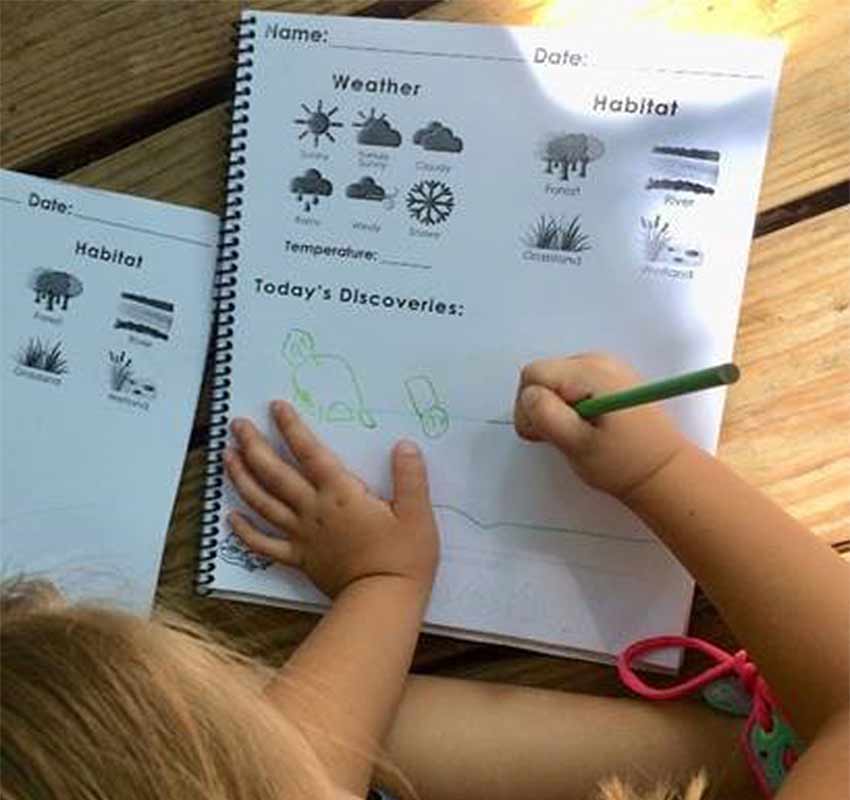
A child regularly utilizing curiosity, engagement, persistence and inventiveness while exploring the forest can then translate these positive approaches to help them become successful learners in later schooling and throughout their life.
"Children are such curious creatures. They explore, question and wonder, and by doing so, learn…For too many children, curiosity fades. Curiosity dimmed is a future denied. Our potential – emotional, social, and cognitive – is expressed through the quantity and quality of our experiences. And the less-curious child will make fewer new friends, join fewer social groups, read fewer books, and take fewer hikes. The less-curious child is harder to teach because he is harder to inspire, enthuse, and motivate.” — Dr. Bruce D. Perry, 2011
Instilling Healthy Habits for Life
In addition to creating a rich learning environment where children can practice kindergarten-readiness skills, it has long been known that time spent in the natural world provides a host of other physical, mental, and social benefits.
By establishing the habit of regular outdoor time during childhood, we support children in making healthy choices to carry with them into adulthood.
Below are eight benefits of outdoor time that can help create the foundation for a well-balanced lifestyle:
- Increase physical activity. Research has shown that moderate to vigorous physical activity in child care settings increased from 1% indoors to as much as 17% outdoors. Getting outside allows children to move more, decreasing their risk of obesity while increasing their stamina and coordination.
- Build vitamin D. Sunshine builds Vitamin D levels, which plays a crucial role in strengthening bone health, creating a healthy immune system and ensuring a good night’s sleep (yay for parents!).
- Reduce risk of near-sightedness. A study published by the American Academy of Ophthalmology found that kids who spend time outside are at a reduced risk of developing "myopia," or nearsightedness. The team of researchers found that a child's chances of developing myopia dropped by two percent for each additional hour spent outdoors, per week.
- Reduce stress. Even children can be susceptible to stress from busy schedules, lack of sleep or too much screen time. Spending time in nature can help relieve stress and anxiety while boosting feelings of happiness and wellbeing
- Increase creative thinking. Being in the open surrounded by plants and trees can stimulate a child’s imagination power and tap into their creativity. Imaginative games can quickly take foot while natural materials evolve into fairy wands and fishing poles.
- Builds resiliency and adaptability. Working hard to hike up a hill or finding joy during a cold and windy day builds resiliency and adaptability. The development of these character skills will help prevent children from expecting that happiness can only come through easy or ideal circumstances.
- Social skills. In outdoor settings, children are more motivated to work together in groups, which can improve their social skills. They learn to manage conflicts, communicate, and cooperate with their peers in a more effective manner.
- Sense of wonder/environmental stewardship. In her article “The Wonders of Nature: Honoring Children’s Way of Knowing,” Ruth Wilson, Ph.D. notes, “Early experiences with the natural world have been positively linked with the sense of wonder. This way of knowing, if recognized and honored, can serve as a lifelong source of joy and enrichment, as well as an impetus, or motivation, for further learning. The early childhood years are a crucial period in the formation of lasting adult values. Could we do any better than to ensure that those values include a deep love for the outdoors and a true sense of wonder?”
Ready, Set, Go (Outside!)
The early childhood years are an important time of rapid growth and learning. Young children are exploring what they can do with their minds and bodies and creating relationships with the people and world around them.
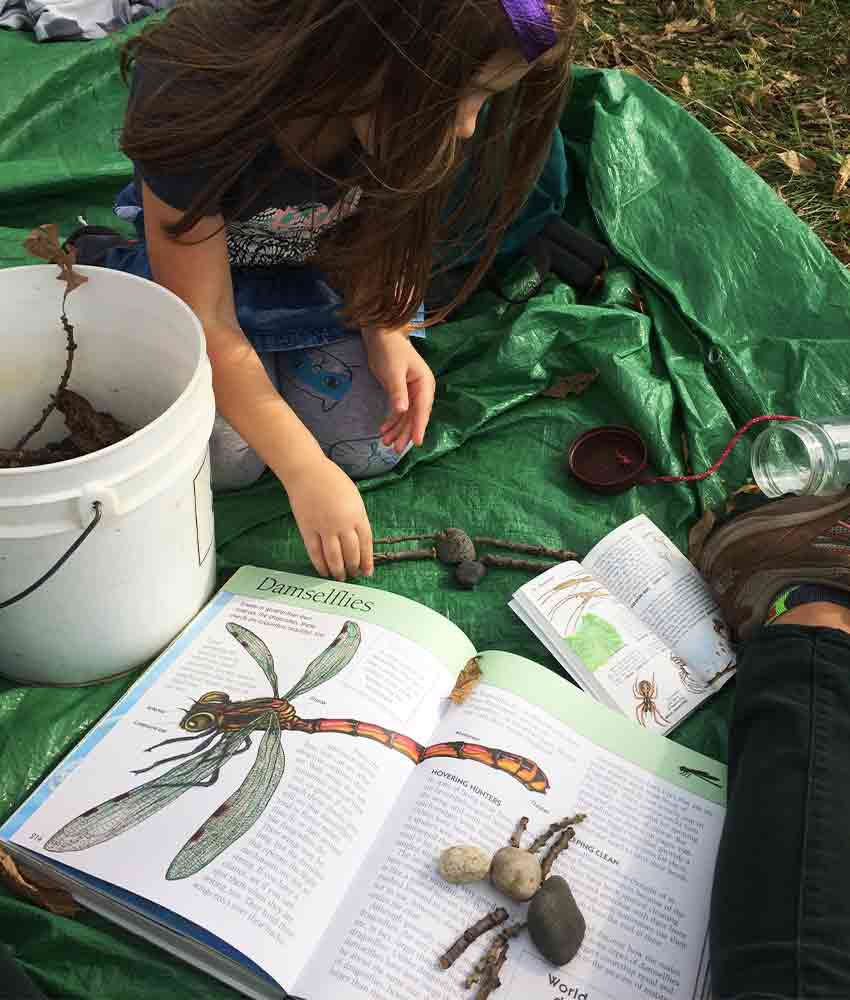
Outdoor programs such as Nature School, aim to fill these early years with positive and fun learning experiences that allow children to truly fall in love with learning. They also recognize the importance of creating healthy lifelong habits through time spent outdoors. Interested in incorporating more outdoor time into your preschoolers life?
Here are a few ideas of where to start:
- Nature play at home. Go for a walk, plant some veggies, have a campfire, or as our parents used to...simply “show your kids the door” from time to time. Need some inspiration? Use A Parent’s Guide to Nature Play by Ken Finch or search Pinterest for ideas on how to make nature play a part of your family’s life.
- Attend a class or event at a nature center. Three Rivers Park District offers family-friendly events, preschool drop-off classes and adult/child programs to fit a variety of interests. Fine-tune your search process by selecting a category of “preschool,” “family” or “free,” along with your desired park location to find a program that is just right for you!
- Enroll in a Nature Preschool. Learn more about Nature School by attending the Open House on January 27 from 4-7 PM at Mississippi Gateway Regional Park or by visiting our website.
About the Author

Megan Kelzenberg is an Interpretative Naturalist at Mississippi Gateway Regional Park. She has worked for Three Rivers Park District since 2008. During this time, she has specialized in teaching early childhood programming throughout the park system, with topics ranging from environmental education to outdoor recreation and cultural history. She also has previous experience working at a nature-based preschool, the US Fish & Wildlife Service, a zoo and several Minnesota-based nature centers. Outside of work, she enjoys gardening, paddling, hiking, home improvement projects, and spending time with her husband and two young children.
Related Blog Posts
Our 7 Favorite Winter Activities
By: Ashley Smith Anders Hanson
We've compiled a list of our 7 favorite activities to help you embrace winter this season. Some of them might be things you've already done before, but a few of them might be new activities you want to try!
Nature’s Classroom for 50 Years: Early Citizen Science and Monarch Research
By: Laurel Sundberg
Little was known about the winter whereabouts of the monarch butterfly until the mid-1970s. Subtle factors, persistence and a network of people working across borders came together to finally reveal the mystery of the great monarch migration. Read on to learn how Minnesota occupies an important place in the history of monarch research.
Nature's Classroom for 50 Years: The Dream of Lowry Nature Center
By: Allison Neaton
Lowry Nature Center turns 50 years old in 2019. Discover how the dream of one man became a reality and how Goodrich Lowry helped shape the future of what is now Three Rivers Park District.
